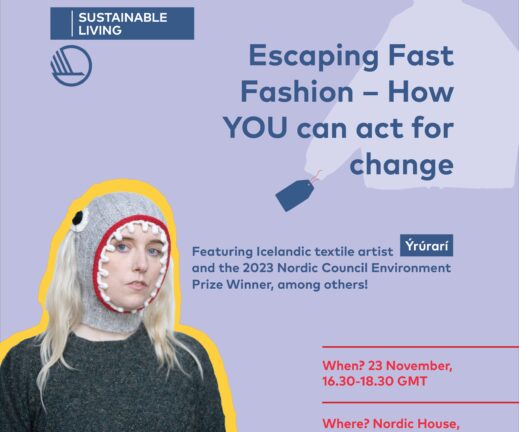Did you know that people in the Nordics buy more clothes than the rest of the world and our consumption has gone up during the last 20 years? It’s time to check our shopping habits and spin towards more sustainable choices. Join us for an evening where we find a new direction through an interactive mending workshop and keynotes to deepen our understanding of fast fashion’s destructive impacts on our planet and its people!
Escaping Fast Fashion: How you can act for change from The Nordic House on Vimeo.
Textile production generates 1.2 billion tons of CO2e annually, outdoing emissions from international flights and shipping. However, we continue to buy too many clothes, as many as 40 garments per year!
Join us the night before Black Friday, on 23 November in Reykjavik or online to explore sustainable fashion alternatives. Under the guidance of Icelandic textile artist Ýrúrarí and with inspiration from the Nordic Council Environment Prize Winner 2023, we’ll breathe new life into our old clothes and uncover ways to break up with fast fashion.
It is possible to participate both physically and online, and participation is free, but you need to sign up on the event page.
Program highlights:
- Martin Stenfors, Head of Sustainability and Strategy at Renewcell – the winner of the Nordic Council Environment Prize 2023, will tell us about Renewcell‘s groundbreaking solution for recycling and reusing textile waste for use in new clothes.
- Icelandic textile artist Ýrúrarí will showcase the needle felting technique, illustrating a creative approach to textile repair. Bring your own clothing that you want to mend!
- Åsa Guldbrandsen, advisor at Framtiden i våre hender Norge, provides insights on youth engagement and necessary policies.
- Emily Richey Stavrand, Umhverfissinnar, discusses the human cost of fast fashion.
- Sustainability specialist Tinna Hallgrímsdóttir will lead a panel debate and engage the audience in the discussion.
The event is organized by The Nordic House in Reykjavik, the Nordic Council Environment Prize, and the project Youth for Sustainable Living, led by Nordregio.
Funder: The Nordic Council of Ministers


